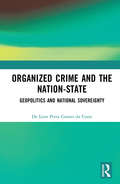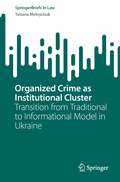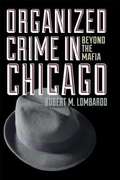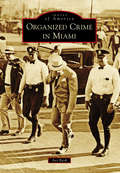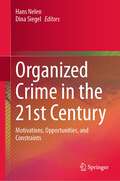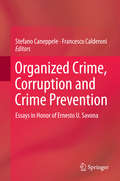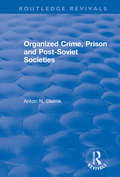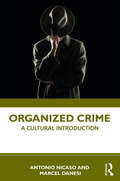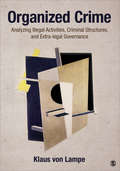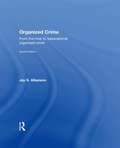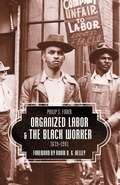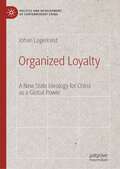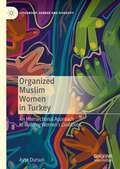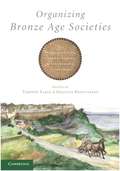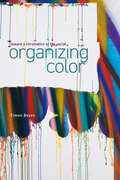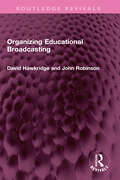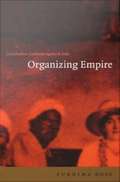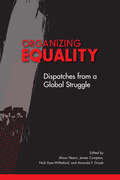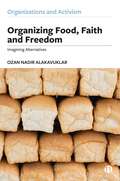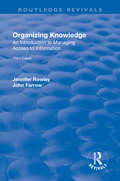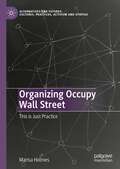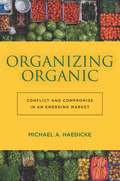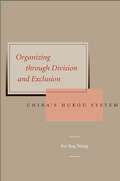- Table View
- List View
Organized Crime and the Nation-State: Geopolitics and National Sovereignty
by De Leon Petta Gomes da CostaGeopolitics is an increasingly important tool to understand national and international relations. This book unravels how organized crime is not just a marginal problem but part of a bigger geopolitical and asymmetrical warfare strategy. It seeks to establish a direct relationship between Nation States and organized crime groups. Many States have been using criminal and terrorist organizations as a policy for issues of national sovereignty or as a tool to strengthen a nation’s geopolitical position. This book demonstrates how national states are utilizing criminal organizations in covert operations and "dirty jobs" such as espionage, proxy war, arms trafficking and sabotage. Examples from the United States, China and the Soviet Union are explored, providing both an historical and contemporary analysis, from World War II through to the Cold War and to the present day. The book brings together perspectives from international relations and criminology drawing on insights from a variety of sources, including public documents and interviews.
Organized Crime as Institutional Cluster: Transition from Traditional to Informational Model in Ukraine (SpringerBriefs in Law)
by Tetiana MelnychukFrom the perspective of institutionalism and theories of clusters, this book provides a concept of organized crime as an institutional cluster in contrast to the concept of multiple offences, associated with organized criminal groups or/and criminal organizations. The book offers shifts in the methodology of organized crime analysis and extrapolates the tools of cluster modelling – successfully approbated in the social and economic sciences as a method for the organization of spatially localized systems – to the criminological field. Such an approach gives a fresh view of organized crime essence and contributes to the deeper and more sophisticated understanding of organized crime modus operandi, as well as its influence on the social landscape.Organized crime in today’s world is increasingly moving from rigidly structured entities to decentralization with unclear, blurred edges and a hybrid structure, which is dictated by the rationality of adapting to social change, including the emergence of new widespread demands for illegal goods and services, new ways to evade social control, the prevalence of poly-criminal activities, the involvement in general digitalization, and so on. Specifically, the study is focused on the evolution of organized crime models in Ukraine considering the socioeconomic, political, and ideological background. Organized crime in Ukraine has gone through numerous transitions, encompassing professionally or traditionally organized criminal groups (the so-called community of ‘thieves in law’), functional racketeering groups, businessmen who accumulated their initial capital through the shadow economy, bureaucratically constructed groups from former official vertically powerful ruling circles, networks of personal or professional connections of the Soviet special services, oligarchic-clan pyramidal structures and amorphous delocalized cyber entities.This book also gives a broad picture of contemporary criminal clusters in Ukraine and an assessment of a full-scale war’s impact. Russia’s invasion on 24 February 2022 and massive hostilities provoked a turbulent situation for organized crime, resulting in the breaking of former criminal ties and the degradation of certain criminal and corrupt practices. At the same time, the war and the martial law regime created opportunities for organized crime in Ukraine to develop new illegal markets and relocate existing ones.
Organized Crime in Chicago: Beyond the Mafia
by Robert M. LombardoThis book provides a comprehensive sociological explanation for the emergence and continuation of organized crime in Chicago. Tracing the roots of political corruption that afforded protection to gambling, prostitution, and other vice activity in Chicago and other large American cities, Robert M. Lombardo challenges the dominant belief that organized crime in America descended directly from the Sicilian Mafia. According to this widespread "alien conspiracy" theory, organized crime evolved in a linear fashion beginning with the Mafia in Sicily, emerging in the form of the Black Hand in America's immigrant colonies, and culminating in the development of the Cosa Nostra in America's urban centers. Looking beyond this Mafia paradigm, this volume argues that the development of organized crime in Chicago and other large American cities was rooted in the social structure of American society. Specifically, Lombardo ties organized crime to the emergence of machine politics in America's urban centers. From nineteenth-century vice syndicates to the modern-day Outfit, Chicago's criminal underworld could not have existed without the blessing of those who controlled municipal, county, and state government. These practices were not imported from Sicily, Lombardo contends, but were bred in the socially disorganized slums of America where elected officials routinely franchised vice and crime in exchange for money and votes. This book also traces the history of the African-American community's participation in traditional organized crime in Chicago and offers new perspectives on the organizational structure of the Chicago Outfit, the traditional organized crime group in Chicago.
Organized Crime in Miami (Images of America)
by Avi BashWhile other cities are credited for birthing and honing the legendary crime figures who inevitably influenced and shaped their susceptible surroundings and culture, Miami is where the Mob, like many American citizens, often turned when seeking vacation, vice, or a new beginning. Dating back to the first quarter of the 20th century, resourceful gangsters from across the nation recognized the profitable business opportunities Miami could provide with its booming population, perfect year-round climate, cooperative law enforcement, and mutual understanding among otherwise rival gangs. The promise of an open city, free from familiar encumbrances and restrictions, prompted eager mobsters from around the country to migrate south and trade in their suits and fedoras for swim trunks and flip-flops. Organized Crime in Miami examines the considerable yet heavily underpublicized involvement of the American Mafia in South Florida and its lasting impact on the community through their business activities, both illegal and within the confines of the law.
Organized Crime in the 21st Century: Motivations, Opportunities, and Constraints
by Dina Siegel Hans NelenThis edited volume brings together the most recent research about various aspects of organized crime and the responses that have developed worldwide as a result to contain serious criminal acts. This book focuses particularly on the way criminal networking and illegal markets have developed during the first two decades of the 21st century. It examines how these developments have influenced the motivations and opportunities to commit organized crime. The volume not only focuses on illegal activities in illegal markets, such as drug and human trafficking, but also addresses organized crime and deviance in various legitimate industries. The contributions were presented at seminars of the Centre for Information and Research on Organized Crime (CIROC), and will be of particular interest to organized crime scholars and researchers, as well as advanced students of criminology across the world.
Organized Crime, Corruption and Crime Prevention
by Francesco Calderoni Stefano CaneppeleThis volume collects new contributions to research on mafias, organized crime, money laundering, and other forms of complex crimes, gathering some of the most authoritative and well-known scholars in the field. The chapters for this volume are original peices written in honor of the retirement of Dr. Ernesto U. Savona, highlighting his research and legacy. Throughout his academic career, Professor Ernesto U. Savona has investigated complex crimes ranging from organized crime, to economic crime, to money laundering. In his work, he has tried to bring together academics, policy makers, and practitioners to bring understanding for crime problems and innovative solutions. His passion towards the practical application of the findings of scientific research led him to found Transcrime in 1994, which is today among the most important criminological think-tanks in Europe. This important book is aimed at scholars studying criminal policy and research, particularly in the areas of criminal networks, organized crime, white collar crime, the history of criminology.
Organized Crime, Prison and Post-Soviet Societies
by Anton Oleinik Alain TouraineThis title was first published in 2003. The "Red Mafia" in Russia have become the subject of increasing international interest and considerable misinterpretation. After well-received editions in Russian, French and Italian, Anton Oleinik's study of Russian prisons, in which he explores the social roots of organized crime in post-Soviet societies, is now published in English. This English edition includes a postscript on the Moscow terrorist crisis of 2002. Oleinik's analysis reveals prison society as a mirror of broader Russian society - characterized by the absence of the state as an organizer of social practices. He builds on this to make a central distinction between two types of societies - the modern "large" society and the "small" society, like Russia, that has only been partially modernized, and in which the world of everyday life, experiences and relationships remains entirely separated from the official aims of modernization and efficiency. Oleinik is interested in the void between these two separate worlds, a void he sees being filled in Russia by the Mafia.
Organized Crime: A Cultural Introduction
by Marcel Danesi Antonio NicasoThis book aims to describe and demystify what makes criminal gangs so culturally powerful. It examines their codes of conduct, initiation rites, secret communications methods, origin myths, symbols, and the like that imbue the gangsters with the pride and nonchalance that goes hand in hand with their criminal activities. Mobsters are everywhere in the movies, on television, and on websites. Contemporary societies are clearly fascinated by them. Why is this so? What feature and constituents of organized criminal gangs make them so emotionally powerful—to themselves and others? These are the questions that have guided the writing of this textbook, which is intended as an introduction to organized crime from the angle of cultural analysis. Key topics include: • An historic overview of organized crime, including the social, economic, and cultural conditions that favour its development; • A review of the type of people who make up organized gangs and the activities in which they engage; • The symbols, rituals, codes and languages that characterize criminal institutions; • The relationship between organized crime and cybercrime; • The role of women in organized crime; • Drugs and narco-terrorism; • Media portrayals of organized crime. Organized Crime includes case studies and offers an accessible, interdisciplinary approach to the subject of organized crime. It is essential reading for students engaged with organized crime across criminology, sociology, anthropology and psychology.
Organized Crime: Analyzing Illegal Activities, Criminal Structures, and Extra-legal Governance (The\cross-border Crime Colloquium Ser. #11)
by Klaus von Lampe2016 Outstanding Publication Award (The International Association for the Study of Organized Crime) Organized Crime: Analyzing Illegal Activities, Criminal Structures, and Extra-legal Governance provides a systematic overview of the processes and structures commonly labeled "organized crime," drawing on the pertinent empirical and theoretical literature primarily from North America, Europe, and Australia. The main emphasis is placed on a comprehensive classificatory scheme that highlights underlying patterns and dynamics, rather than particular historical manifestations of organized crime. Esteemed author Klaus von Lampe strategically breaks the book down into three key dimensions: (1) illegal activities, (2) patterns of interpersonal relations that are directly or indirectly supporting these illegal activities, and (3) overarching illegal power structures that regulate and control these illegal activities and also extend their influence into the legal spheres of society. Within this framework, numerous case studies and topical issues from a variety of countries illustrate meaningful application of the conceptual and theoretical discussion.
Organized Crime: Analyzing Illegal Activities, Criminal Structures, and Extra-legal Governance (The\cross-border Crime Colloquium Ser. #11)
by Klaus von Lampe2016 Outstanding Publication Award (The International Association for the Study of Organized Crime) Organized Crime: Analyzing Illegal Activities, Criminal Structures, and Extra-legal Governance provides a systematic overview of the processes and structures commonly labeled "organized crime," drawing on the pertinent empirical and theoretical literature primarily from North America, Europe, and Australia. The main emphasis is placed on a comprehensive classificatory scheme that highlights underlying patterns and dynamics, rather than particular historical manifestations of organized crime. Esteemed author Klaus von Lampe strategically breaks the book down into three key dimensions: (1) illegal activities, (2) patterns of interpersonal relations that are directly or indirectly supporting these illegal activities, and (3) overarching illegal power structures that regulate and control these illegal activities and also extend their influence into the legal spheres of society. Within this framework, numerous case studies and topical issues from a variety of countries illustrate meaningful application of the conceptual and theoretical discussion.
Organized Crime: From the Mob to Transnational Organized Crime
by Jay S. AlbaneseOrganized Crime: From the Mob to Transnational Organized Crime, Seventh Edition, provides readers with a clear understanding of organized crime, including its definition and causes, how it is categorized under the law, models to explain its persistence, and the criminal justice response to organized crime, including investigation, prosecution, defense, and sentencing. This book offers a comprehensive survey, including an extensive history of the Mafia in the United States; a legal analysis of the offenses that underlie organized crimes; specific attention to modern manifestations of organized crime activity, such as human smuggling, Internet crimes, and other transnational criminal operations; and the application of ethics to the study of organized crime. A new section has been added on threat assessment in organized crime. Chapters are enhanced by updated photos, tables, charts, and critical thinking exercises that help students apply concepts to actual organized crime cases. Every chapter includes two student-friendly special features: Organized Crime Biography and Organized Crime at the Movies. A glossary gives students a quick reference for looking up important definitions of organized crime-related terms, and a Timeline of Organized Crime in the United States highlights important events in the history of organized crime.
Organized Labor and the Black Worker, 1619-1981
by Philip S. FonerIn this classic account, historian Philip Foner traces the radical history of black workers’ contribution to the American labor movement.
Organized Loyalty: A New State Ideology for China as a Global Power (Politics and Development of Contemporary China)
by Johan LagerkvistThis book analyses the ideology that China's leader Xi Jinping has crafted during his decade in power. China’s political system and domestic and foreign policies have, between 2012 and 2022, become more defined by the political thought of Xi Jinping, the most powerful leader of the Chinese Communist Party since the time of Mao Zedong. Today, Xi’s China is embroiled in superpower rivalry with the United States and its allies. Therefore, ongoing ideological transformation in the People’s Republic is destined to have global repercussions. Yet surprisingly, the ideological mission of Xi Jinping is poorly understood. Based on analysis of Xi Jinping’s collected speeches, the book argues that China’s new state ideology is constructed around the three key concepts of loyalty, discipline, and greatness. Xi’s mission is about ideological re-orientation and re-activation, as well as organizational innovation, seeking to frame China’s “national self” as a collective unit under one political banner and one leader. However, despite the monumental Party-state effort to boost the new ideology and state-scripted “moral careers”, the book contends that Xi Jinping cannot take for granted that political and patriotic loyalty will forever trump the formation of “disloyal moral careers” in society.
Organized Muslim Women in Turkey: An Intersectional Approach to Building Women’s Coalitions (Citizenship, Gender and Diversity)
by Ayşe DursunThis book explores the politics of organized Muslim women in Turkey and analyzes their coalitions with other—secular feminist, Kurdish, etc.—women’s movements from an intersectional perspective. It provides empirical evidence for significant changes in Muslim women’s politics under the ruling Justice and Development Party (AKP) and points to the increasing difficulty to build cross-movement women’s coalitions in the face of rising religious-conservatism and authoritarianism under the AKP rule. While feminist Muslim women who display an intersectional understanding of structural inequality and oppression are found to be more resilient in the face of political pressure, conservative Muslim women dodge women’s coalitions and align with the government’s discourses and policies. Empirical evidence based on interviews with organized Muslim women also shows that prospects for coalition building largely depends on the specific societal and institutional (re-)configurations of patriarchy along with other relations of domination rather than mere ideological “difference” among women. This book will be of interest to scholars and students across Gender Studies, Sociology, and Political Science, particularly those whose research focuses on intersectionality and social movements.
Organized White Women and the Challenge of Racial Integration, 1945-1965
by Helen LavilleThis monograph asserts that the troubled history of segregation within American women's associations created a legacy of racial exclusivity and privilege. While acknowledging the progressive potential of women's associations and the extent to which they created a legitimate outlet for American women's public activism, it explores how and why such organizations failed to aid in issues of integration. Rather than being a historical accident, or a pragmatic response to circumstance, this monograph demonstrates that white exclusivity and privilege was crucial to the authority and influence of these associations. Organized White Women and the Challenge of Race Relations examines the translation of what seemed on the surface to be relatively simple demands for racial integration into a far more significant and all-encompassing confrontation with the frequently hidden structures and practices of white privilege.
Organizing Bronze Age Societies
by Timothy Earle Kristian KristiansenThe Bronze Age was a formative period in European history when the organisation of landscapes, settlements, and economy reached a new level of complexity. This book presents the first in-depth, comparative study of household economy and settlement in three micro-regions: the Mediterranean (Sicily), Central Europe (Hungary), and Northern Europe (South Scandinavia). The results are based on ten years of fieldwork in a similar method of documentation, and scientific analyses were used in each of the regional studies, making controlled comparisons possible. The new evidence demonstrates how differences in settlement organisation and household economies were counterbalanced by similarities in the organised use of the landscape in an economy dominated by the herding of large flocks of sheep and cattle. This book's innovative theoretical and methodological approaches will be of relevance to all researchers of landscape and settlement history.
Organizing Color: Toward a Chromatics of the Social (Sensing Media: Aesthetics, Philosophy, and Cultures of Media)
by Timon BeyesWe live in a world that is saturated with color, but how should we make sense of color's force and capacities? This book develops a theory of color as fundamental medium of the social. Constructed as a montage of scenes from the past two hundred years, Organizing Color demonstrates how the interests of capital, management, governance, science, and the arts have wrestled with color's allure and flux. Beyes takes readers from Goethe's chocolate experiments in search of chromatic transformation to nineteenth-century Scottish cotton mills designed to modulate workers' moods and productivity, from the colonial production of Indigo in India to globalized categories of skin colorism and their disavowal. Tracing the consumption, control and excess of industrial and digital color, other chapters stage encounters with the literary chromatics of Pynchon's Gravity's Rainbow processing the machinery of the chemical industries, the red of political revolt in Godard's films, and the blur of education and critique in Steyerl's Adorno's Grey. Contributing to a more general reconsideration of aesthetic capitalism and the role of sensory media, this book seeks to pioneer a theory of social organization—a "chromatics of organizing"—that is attuned to the protean and world-making capacity of color.
Organizing Educational Broadcasting (Routledge Revivals)
by John Robinson David HawkridgeFirst published in 1982, Organizing Educational Broadcasting provides advice and guidance in organizational and managerial skills for those responsible for the operation of educational broadcasting systems. It is principally designed for those who actually work within educational radio and television systems. They are the people who perhaps stand to gain most by reading about international case studies. In addition, high-level decision-makers, planners and others who are concerned with conceptualizing, planning and implementing new systems, or more likely, modifying old ones, will find much to interest them.
Organizing Empire: Individualism, Collective Agency, and India
by Purnima BoseOrganizing Empire critically examines how concepts of individualism functioned to support and resist British imperialism in India. Through readings of British colonial and Indian nationalist narratives that emerged in parliamentary debates, popular colonial histories, newsletters, memoirs, biographies, and novels, Purnima Bose investigates the ramifications of reducing collective activism to individual intentions. Paying particular attention to the construction of gender, she shows that ideas of individualism rhetorically and theoretically bind colonials, feminists, nationalists, and neocolonials to one another. She demonstrates how reliance on ideas of the individual--as scapegoat or hero--enabled colonial and neocolonial powers to deny the violence that they perpetrated. At the same time, she shows how analyses of the role of the individual provide a window into the dynamics and limitations of state formations and feminist and nationalist resistance movements. From a historically grounded, feminist perspective, Bose offers four case studies, each of which illuminates a distinct individualizing rhetorical strategy. She looks at the parliamentary debates on the Amritsar Massacre of 1919, in which several hundred unarmed Indian protesters were killed; Margaret Cousins's firsthand account of feminist organizing in Ireland and India; Kalpana Dutt's memoir of the Bengali terrorist movement of the 1930s, which was modeled in part on Irish anticolonial activity; and the popular histories generated by ex-colonial officials and their wives. Bringing to the fore the constraints that colonial domination placed upon agency and activism, Organizing Empire highlights the complexity of the multiple narratives that constitute British colonial history.
Organizing Equality: Dispatches from a Global Struggle (McGill-Queen's Studies in Protest, Power, and Resistance)
by Alison Hearn, James Compton, Nick Dyer-Witheford and Amanda F. GrzybStruggles for equality happen in all corners of the world. While social and economic justice movements are specific to their different national contexts, identities, and forms of oppression, collaboration and coalition building are required if we are to attain sustainable equality and healing justice.Organizing Equality engages activist and scholarly debates about the organization of social and economic equality movements around the globe. The collection covers a myriad of issues, approaches, and experiences, forging a link between critical scholarly studies and journalistic and artistic works that offer more personal and hands-on perspectives. Moving from a broad discussion of resistance and solidarity, contributors examine case studies in their specific national contexts, such as movement building in Greece, caste politics in India, land struggles in Guatemala, student debt resistance movements in the United States, and the fight to indigenize higher education in Canada.Organizing Equality encourages understanding and collaboration between opposing views as a means of discovering new practices of seeing, learning, organizing, and being together in our movements for equality.
Organizing Food, Faith and Freedom: Imagining Alternatives (Organizations and Activism)
by Ozan Nadir AlakavuklarConsumerism, unsustainable growth, waste and inequalities continue to ail societies across the globe, but creative collectives have been tackling these issues at a grassroots level. Based on an autoethnographic study about a free food store in Aotearoa New Zealand, this book presents a first-hand account of how a community is organized around surplus food to deal with food poverty, while also helping the reader to see through the complexity that brings the free food store to life. Examining how alternative economies and relations emerge from these community solutions, the author shows it is possible to think, act and organize differently within and beyond capitalist dynamics.
Organizing Knowledge: Introduction to Access to Information
by John Farrow J.E. RowleyThis title was first published in 2000: For its third edition, this text on knowledge organization and retrieval has been revised and restructured to accommodate the increased significance of electronic information resources. With new sections on topics such as information retrieval via the Web, metadata and managing information retrieval systems, the book explains principles relating to hybrid print-based and electronic networked environments experienced by today's users. The book is an accessible introduction to knowledge organization for both undergraduate and postgraduate students of information management and information systems.
Organizing Occupy Wall Street: This is Just Practice (Alternatives and Futures: Cultures, Practices, Activism and Utopias)
by Marisa HolmesThis book is the first study of the processes and structures of the Occupy Wall Street movement, written from the perspective of a core organizer who was involved from the inception to the end. While much has been written on OWS, few books have focused on how the movement was organized. Marisa Holmes, an organizer of OWS in New York City, aims to fill this gap by deriving the theory from the practice and analyzing a broad range of original primary sources, from collective statements, structure documents, meeting minutes, and live tweets, to hundreds of hours of footage from the OWS Media Working Group archive. In doing so, she reveals how the movement was organized in practice, which experiments were most successful, and what future generations can learn.
Organizing Organic: Conflict and Compromise in an Emerging Market
by Michael HaedickeStakeholders in the organic food movement agree that it has the potential to transform our food system, and yet there is little consensus about what this transformation should look like. Tracing the history of the organic food sector, Michael A. Haedicke charts the development of two narratives that do more than simply polarize the organic debate, they give way to competing institutional logics. On the one hand, social activists contend that organics can break up the concentration of power that rests in the hands of a big, traditional agribusiness. Alternatively, professionals who are steeped in the culture of business emphasize the potential for market growth, for fostering better behemoths. Independent food store owners are then left to reconcile these ideas as they construct their professional identities and hone their business strategies. Drawing on extensive interviews and unique archival sources, Haedicke looks at how these groups make sense of their everyday work. He pays particular attention to instances in which individuals overcome the conflicting narratives of industry transformation and market expansion by creating new cultural concepts and organizational forms. At once an account of the sector's development and an analysis of individual choices within it, Organizing Organic provides a nuanced account of the way the organic movement continues to negotiate ethical values and economic productivity.
Organizing Through Division and Exclusion: China’s Hukou System
by Fei-Ling WangThis book is the first comprehensive examination of China's hukou (household registration) system. The hukou system registers and governs the 1.3 billion Chinese, while creating deep and rigid divisions and exclusions; in many domains the system determines how the Chinese live and shapes China's sociopolitical structure and socioeconomic development. This book shows that the system has made both positive and negative contributions to contemporary Chinese society: it has helped foster rapid economic growth and political stability, but also has reinforced social stratification, the rural-urban divide, regional inequalities, and discrimination and injustice. Using rich new materials, this book traces the history and development of the hukou system. It describes the functions, impact, and operational mechanisms of the system. It also analyzes the hukou in comparison with the systems of exclusion and discrimination in other nations, notably Brazil and India. This book presents important insights for understanding China's past, present, and future.
